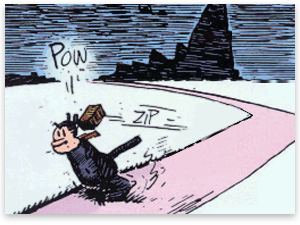

|
Friday, August 31, 2012 
The Voice of TyrannyThe reporting on a violent incident at the Occupy protests last year reveals the linguistic lengths to which newspapers can go to hide responsibility. The National Post said it best:
Olsen was standing about 30 feet from the police barricades at Occupy Oakland when the cops launched tear gas and fired bean-bag rounds into the crowd. The hit to Olsen's forehead knocked him down on the concrete and fractured his skull. 
Passive-Voice ViolenceThis is pretty high-action stuff. A simple way to say it would be "On Tuesday, police struggling with protestors hit two-tour US Marine vet Scott Olsen in the head with a tear-gas canister." Regardless of whether the police action was legal or justified, such an opening would at least shine the light on who did what to whom. But instead the Post chose to use the passive voice: a way of writing that emphasizes the thing acted on rather than the thing or person acting. Olsen "was struck in the head" (he was struck, you see; nobody struck him) "by a tear gas canister" (darned thing), which was itself "fired on Tuesday by police." In George Orwell's "Politics and the English Language," he lists the passive voice as part of a "catalogue of swindles and perversions" — techniques in political writing "designed to make lies sound truthful and murder respectable, and to give an appearance of solidity to pure wind." In the active voice, the subject of the sentence takes a direct action. For example, you might say Richard Nixon made a mistake. Or a policeman hit Olsen with a tear-gas canister. In the passive voice, the subject of the sentence is the recipient of the action.[1] Mistakes were made. Olsen was struck in the head. Responsibility was avoided. Telling a story of violence in the passive voice is like putting on a play where figures in shadow beat a man lying in the spotlight. The dramatic focus is on the injured party, and the attackers remain undefined. Underprivileged SubjectsThe passive voice and constructions related to it are good and proper in many contexts. Scientists, for instance, emphasize the neutrality of their experiments by saying things like, "Twenty milligrams of uranium were placed in the centrifuge." But passives are also devilishly useful for expressing imprecise collectivist thoughts; they squeeze the human action out of an event, taking responsibility away from real persons and casting it into thin air or onto vague collectives. Orwell wrote that this is a vicious cycle: our language "becomes ugly and inaccurate because our thoughts are foolish, but the slovenliness of our language makes it easier for us to have foolish thoughts." Consider the term "disadvantaged." When we say, "this child was disadvantaged," it's an adjectival passive — the kid has been disadvantaged by some unknown persons. Really, "disadvantaged" is a euphemism for "poor," but through its passivity it packs in the implication of collective responsibility. For an example of how this trick works, take a look at the beginning of a petition on the leftist site ForceChange.com.
The "underprivileged," one has to guess, are those who are not privileged enough. But who's doing the privileging? And who on earth is subjecting them to "class oppression"? The petition continues,
Aha! Apparently, "we" (meaning "privileged persons") oppressed those poorer than us. That's why "we" (meaning the state) must subsidize these rehab programs to help them. The passive constructions at the beginning of the petition set it up for this doublethink by slipping past the question of who actually inflicted harm on these poor drug addicts. Who criminalizes drugs? Who targets drug-law enforcement against poor (and black) drug users? Who keeps the price of psychiatric counseling high by maintaining a licensed cartel? If we noticed that state officials had contributed to the problem, we might be more skeptical about their ability to fix it. But once you start on the track of the "underprivileged," it's easy to think of economic success as a privilege that never-specified but all-powerful persons either give you or deny you. This language snuffs out the light of economic, praxeological analysis and ushers in a world of shadowy collectives and Marxist myths. Straining to SpeakThe excessive use of the passive voice does not dam up the flow of words with straightforward censorship. It merely damns us to mealymouthed platitudes. We still speak about poverty and violence, but we huddle around the victims of oppression without looking straight at their oppressors. The National Post's article on the Scott Olsen incident is titled "Iraq War Veteran Suffers Life-Threatening Injuries after Being Struck in the Head at Occupy Oakland Protest." Here in the active voice, at the front of the title, is the veteran "suffering." At the back is him "being struck." We are vaguely aware that somebody must have struck him, but who was it? Scott Olsen's head injury rendered him unable to speak for days, and though he could write, he lost the ability to spell properly. Six weeks later, his speech was still "halting and flattened."[2] Those of us still possessed of our faculties of speech and writing might want to use them to communicate as vividly as we can about the real human actions shaping our world. Protestors are not struck by tear-gas canisters flying around on their own. Classes and collectives are not privileged or underprivileged by one another. Individual, acting men and women shape the world for good and ill, relying on ideas as they have thought them and expressed them. In a fit of optimism, Orwell concluded that "the present political chaos is connected with the decay of language,"[3] and therefore, "one can probably bring about some improvement by starting at the verbal end." Mike Reid is primus inter pares at Invisible Order, a libertarian editorial-solutions company. He also teaches anthropology at the University of Winnipeg. Send him mail. Follow him on Twitter. See Mike Reid's article archives. Copyright © 2012 by the Ludwig von Mises Institute. Permission to reprint in whole or in part is hereby granted, provided full credit is given. Notes[1] This isn't a complete definition. A "voice" in grammar has to do with the semantic relationship between a verb and its subject. Subjects can have several different semantic "roles" with respect to a verb. For instance, an agent subject does the verb's action, while a patient subject has it done to him. The passive voice is a construction in which the subject's role is different than it would be in the active voice. [2] He seems to have made a full recovery. Here he is in an interview with Russia Today. [3] Orwell also wrote, "Look back through this essay, and for certain you will find that I have again and again committed the very faults I am protesting against." Back To It Takes Brains
|